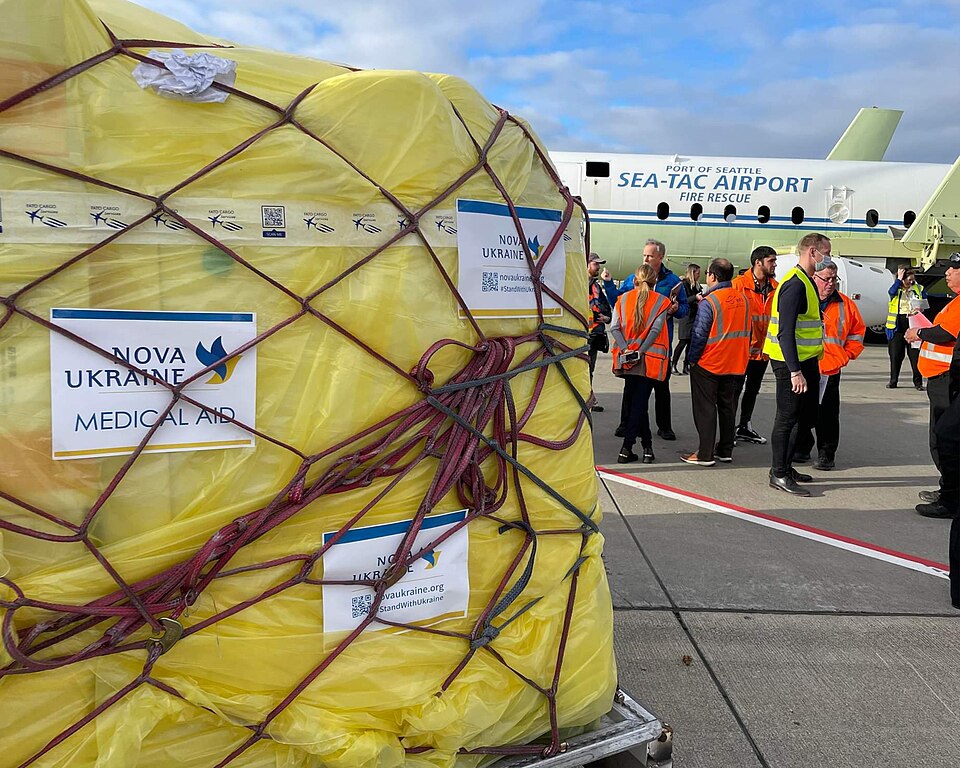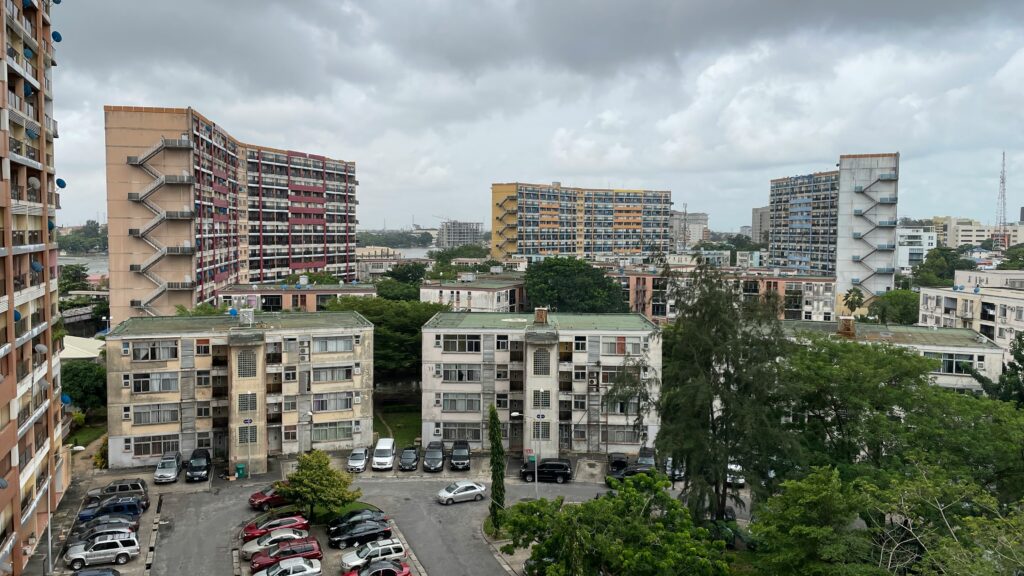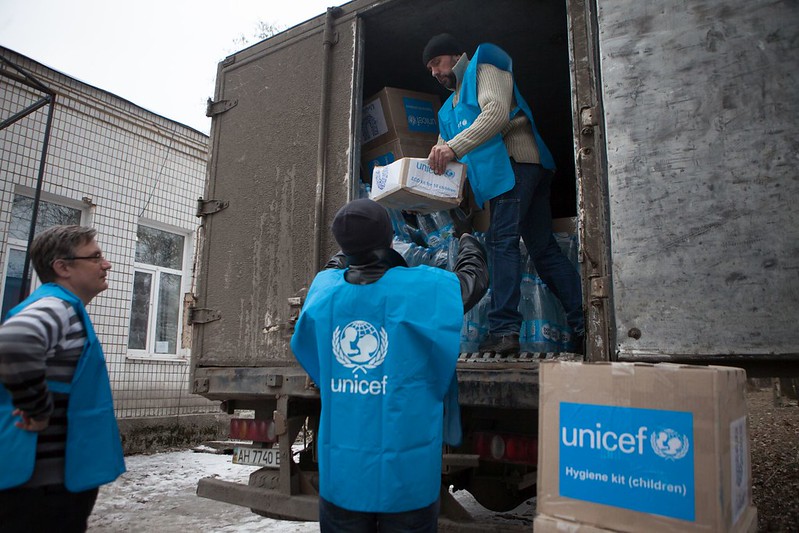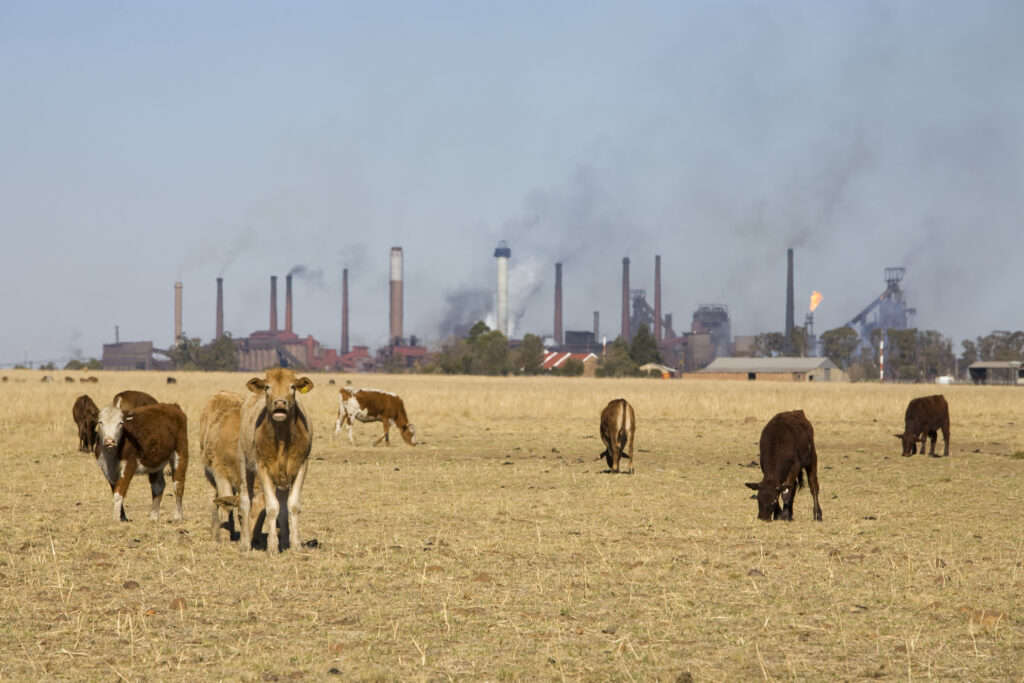Humanitarianism is a broad field that has developed considerably since the 1990s. Accompanying this growth has been a proliferation of researchers seeking to understand and improve humanitarian practices.
The K4DD Humanitarian Evidence and Discourse Summary is a monthly evidence digest sharing the latest humanitarian outputs. They’ve been running since 2020 and feature emerging research and opinion as it is published. They are designed to bring the latest resources directly to humanitarian workers, particularly in these turbulent times. Here’s why evidence summaries like these are needed.

Why is humanitarian evidence needed more than ever?
Even before the recent cuts in government aid, humanitarian actors confronted immense problems. Protracted crises, violent armed actors operating with impunity, a growing number of natural disasters stemming from climate change, violence against refugees and the development of new weapons, are some of the challenges facing the humanitarian sector and beyond.
For several decades, the humanitarian sector has sought to ‘professionalise’ itself. The creation of standards, platforms for sharing best practice, coordination mechanisms, and a culture of research and evidence use, have all contributed to this effort. The sector has also expanded to include new topics and domains of action.
Humanitarian thinking is thriving in many forms. Universities (including the Humanitarian and Conflict Response Institute at the University of Manchester), humanitarian think tanks and organisations, as well as the United Nations (UN), produce regular evidence and discussion. The outputs are rich and varied, covering a range of intersecting and pressing topics which include health, shelter and water, humanitarian diplomacy, civilian protection, anticipatory action, systemic reform and new ways of working.
Seeking to help improve a sector that works in complex, dangerous and uncertain situations, this evidence has contributed to the analysis and improvement of numerous activities, the discovery of new problems, and different ways of thinking about aid.
Keeping up with evidence
The expansion of evidence is certainly a good thing, but the sheer volume of new blogs, papers, databases and more can be hard to keep up with! Especially in such turbulent times.
K4DD’s Humanitarian Evidence and Discourse Summaries are not a review of the evidence on a particular problem, as with K4DD’s Rapid Evidence Reviews that focus on answering a specific thematic question. Instead, the Summaries collate the recent evidence on humanitarianism more broadly, using FCDO’s themes of ‘protect, prioritise and prevent’. Each month, we search for newly published evidence that fits into these broad categories. We then ask a guest editor, either a humanitarian practitioner or researcher, to choose five ‘top reads’ from the list, to highlight evidence they find particularly interesting, or draw out emerging topics and themes in the discourse.
Although we split the publications into evidence, discourse and guidelines, there is no simple way to divide the publications we spotlight, as they are varied in topic and methodology. Publications that are more systematic and based on empirical studies tend to be categorised as evidence. Resources that provide commentary or insights on humanitarian problems are designated as discourse. And publications that disseminate best practices for a particular sub-field of humanitarianism tend to be classified as guidelines.
We hope that people working in the humanitarian sector find the Humanitarian Evidence and Discourse Summaries useful, to:
- bring together a large body of publications in place for easy finding
- assist with the cross-fertilisation of ideas and approaches across ‘siloes’
- introduce readers to a range of topics, disciplines and perspectives
- prompt readers to take a broader view and engage with critical perspectives that they might not otherwise have come across.
It is important to integrate longer and more tailored forms of learning. To this end, K4DD also published a humanitarian resource guide and resource pack signposting a number of online courses and resources for humanitarian practitioners.
Humanitarian aid seeks to address difficult, intractable problems, without straightforward solutions. Nevertheless, the sector has seen progress in understanding on many fronts: from refining famine early warning, to growing evidence on the effectiveness and effects of cash aid, to the importance of intersectional analysis of needs and vulnerability to crisis, the sector has learnt. It is therefore hugely important to be able to collate and disseminate this information. In turbulent times it is more important than ever that actions are supported by considered, evidence-based thinking.
You can find the latest edition of our Humanitarian Evidence and Discourse Summary here.
Increasing the supply of affordable housing in Nigeria is a government priority. Affordable housing refers to housing that can be owned by income groups categorised as below middle income. There are many barriers to the provision of affordable housing and over the years, Nigeria’s housing policy has evolved through numerous iterations to address the demand for affordable housing. Priorities for providing affordable housing and obstacles to addressing gaps in the housing market are examined in our report Priorities for Affordable Housing in Nigeria.

Nigeria’s demand for affordable housing
The demand for affordable housing has been increasing as the government’s public housing programme has been failing to reach its targets. From 2020 to 2023 the goal was to build 20,000 housing units annually. However, only 24% of this target was achieved. With the combined efforts of the public and private sector, only around 70,000 housing units are built annually. This is far short of the target of 700,000 that need to be built to address the housing gap. Deficiencies in housing supply have led to the mushrooming of informal settlements and slum areas, with over 49% of the country’s population living informally.
Barriers to affordable housing and delivery
There are a number of factors that affect the construction of affordable housing. These include: the high cost of building materials; the high costs of accessing land as well as the preparation of sites and services; the shortage of mortgage options in the market for low-income earners as well as revenue and budget limitations that have hindered the completion of projects. Other barriers include: a technical skills shortage in the construction sector (including a lack of skills and training in the use of sustainable low-cost housing technologies) the capacity of government to monitor the implementation of housing programmes; political risk resulting from a lack of continuity between government policies following changes to administrations after elections; complicated local government regulations and cumbersome bureaucratic processes; onerous land registration processes; security of tenure and poor enforcement of property rights.
Government measures to deal with the gap in affordable housing
Various measures are being implemented to address barriers to affordable housing. These include: the establishment of a National Housing Data Centre by the Federal Ministry of Housing and Urban Development (FMHUD); reforms to land registration processes in some states; the establishing of building manufacturing hubs as focal points for skills development in conjunction with the private sector ; specific measures to promote affordable housing such as reforming the Federal Housing Authority (FHA) and the Federal Mortgage Bank of Nigeria (FMBN) so that they are in alignment with an overarching housing agenda, Renewed Hope Agenda which is a blueprint for affordable housing; expanding the Urban Renewal and Slum Upgrading Programme and; streamlining administrative processes to reduce housing costs.
Additional measures recommended by experts
Besides the measures already being implemented, some additional key policies are advocated by experts to increase the affordable housing:
- Public-private partnerships where the private sector collaborates with government to develop housing schemes, to reduce costs and implement new innovations
- Site and service schemes where homeowners actively participate in the construction of their own houses at an affordable cost
- Cooperative housing schemes that entail the combining of resources into cooperatives to develop housing for members.
- Reviewing the Land Act to increase security of tenure for private property developers
- Making housing more affordable to lower income earners through reducing interest rates and creating a secondary mortgage market with loner-term repayment conditions
- The creation of a national credit database to reduce the time taken to evaluate home loan applications
- Government funded infrastructural development through the provision of basic services, water reticulation and roads
- Enforcement of town planning regulations to ensure existing housing infrastructure does not deteriorate and good quality housing is developed
- Addressing corruption in property development. This includes approval processes for property development; inflated contracts and the appointment of incompetent contractors overlooking capable ones
Use of new technologies to promote affordability and sustainable housing
The use of new technologies to reduce costs and promote sustainability are being considered and in some cases applied in housing schemes. These include:
- The use of Dry Construction techniques using recast panels. This encourages energy efficiency and provides thermal insulation
- Interlocking stabilised bricks from local materials. The use of local materials and cement-stabilised bricks is already being applied and has resulted in large cost savings
- Light Gauge Steel (LGS) entails the use of cold-formed steel frames for low-rise buildings. This reduces the need for timber, concrete and masonry and minimizes waste and emissions
- Fibre Cement Technology (FCT) is reinforced fibre cement boards for roofing and walls. This technology is resistant to fires and termites as well as rot. It also limits the use of asbestos which is a health risk
- Compressed Earth Blocks (CEB) entails the use of compact blocks from stabilised earth. This approach uses less lime and cement and is cheaper and more energy efficient than conventional blocks
Action towards affordable housing
It is clear that some steps have been taken to address the critical housing backlog of affordable housing in Nigeria. However, these measures are not sufficient on their own to reduce the housing gap. Good policies need sustained implementation between elected governments.
A holistic approach is required to address all the obstacles to affordable housing. This includes regulatory reforms; an inclusive approach such as ongoing work with the private sector to increase housing delivery and improve mortgage options that target lower income households; sustained urban renewal programmes, development of site and service schemes and the adoption of lower cost, sustainable new housing construction technologies.
The UK Government set out in January 2025 a ‘blueprint to turbocharge’ AI use. But the principles that guide international and state actors’ use of artificial intelligence (AI) have – and continue to be – at the centre of global conversations. International organisations and governments around the world have been working on non-binding and binding principles for multi-lateral AI governance.
Here is what we found in our K4DD report on ‘Multilateral Technology Governance’.

The landscape of AI governance
The types of mechanisms governing AI fall broadly into two categories: binding and non-binding. Non-binding governance has an important role in the multilateral regulation of technologies, in part because it is quicker to adopt than binding regulations. Non-binding mechanisms carry no built-in cost for non-compliance. This makes it easier to attract more participants and also makes non-binding regulations more adaptable to the increasingly fast-paced changes in technology.
The landscape is very rich, and centres primarily around a variety of international organisations, including the Organization for Economic Cooperation and Development (OECD), the United Nations’ Educational, Scientific, and Cultural Organisation (UNESCO) and the International Telecommunications Union (ITU), among others. Of these, UNESCO is unquestionably the most influential actor both by virtue of the widespread adoption of its recommendations with 193 signatories, and the fact that it is highly involved in cooperation with other governance organisations.
The OECD’s governance efforts are also influential, although the OECD’s 38 Member States are comprised solely of high-income countries and do not provide a forum for negotiation with low and middle-income countries. Nevertheless, the OECD’s definition of AI has been widely adopted by all 36 Member States and eight non-member states.
The OECD AI Principles put forward five values-based recommendations for signatories, setting standards for AI that the OECD notes are ‘practical and flexible enough to stand the test of time’. These are:
- Inclusive growth, sustainable development and well-being,
- Human rights and democratic values, including fairness and privacy,
- Transparency and explainability,
- Robustness, security and safety, and
- Accountability.
The G7 also recently focused a significant portion of its policy guidance on AI. This includes the May 2023 Hiroshima Process on Generative Artificial Intelligence, which was followed in May 2024 by the Hiroshima AI Process Friends Group at the OECD.
Inter-Agency Working Group on Artificial Intelligence
Together with UNESCO, the ITU hosts the Inter-Agency Working Group on Artificial Intelligence (IAWG-AI), which brings together expertise within the United Nations system on AI ethics and the ‘strategic approach and roadmap for supporting capacity development’. The group is open to all interested UN members and observers of UN High-level Committees and requires interested entities to designate a senior-level focal point from the organization to contribute to the Group’s work.
Notably, the group is largely responsible for the production of the UN System White Paper on AI Governance. At least within the UN system, the Working Group may serve as an influential actor in shaping UN programming and outreach on AI in the future.
UNESCO’s recommendations
UNESCO’s recommendations on the Ethics of Artificial Intelligence were introduced in 2021 and are the most widely adopted globally, and are applicable to all 194 of UNESCO’s Member States. The recommendations adopt a broad understanding of AI, defining it as ‘systems with the ability to process data in a way which resembles intelligent behaviour’. The recommendations adopt four key values for the effective governance of AI systems:
- Human rights and human dignity;
- Living in peaceful, just, and interconnected societies;
- Ensuring diversity and inclusiveness; and
- Environment and ecosystem flourishing.
The recommendations are wide-ranging, covering issues from surveillance, oversight, data protection, and the environment, and highlight a need for governments and the private sector to build AI systems that protect and promote human rights and fundamental freedoms. Although UNESCO’s recommendations are non-binding in nature, their widespread adoption makes them among both the most inclusive and theoretically effective of the AI governance mechanisms surveyed here.
As part of its work on AI, UNESCO also undertakes State ‘readiness assessments’ as regards AI. These assessments – the most recent of which was Mexico – are undertaken in cooperation with the State in question, and UNESCO’s reports are the product of collaboration with national bodies related to technology and AI governance. In addition to its recommendations and its partnership with the ITU hosting the IAWG-AI, UNESCO hosts the Global AI Ethics and Governance Observatory, which aims to provide policy guidance on AI through research, best practices, and toolkits. Importantly, it includes questions of ethics, governance, innovation and standards, and even neurotechnology in this work.
The role of standard-setting organisations
Standards-setting plays an important role in the international governance of any technology, including AI. Like non-binding international agreements, standards constitute a voluntary mechanism. The two most important standards-setting bodies as regards AI are the International Organization for Standardization (ISO) and the International Electrotechnical Commission (IEC). Both are non-governmental organizations, with membership comprised of national standards-setting institutions. The non-governmental status of both institutions means they rely on direct financial contributions from buy-in as opposed to public financial support.
Both the ISO and ICE jointly co-host the Committee on Artificial Intelligence – SC 42 – which plays a role in shaping standardisation in AI. Founded in 2017, SC 42 is a consensus-based body with 60 countries currently represented in the body. SC 42 operates under a one-country, one-vote policy and has five working groups: Foundational standards, Big Data, Trustworthiness, Use cases and applications, and computational approaches and characteristics of artificial intelligence.
The importance of non-binding mechanisms
As AI continues to evolve, bodies leveraging non-binding influence—such as the OECD, UNESCO, and standards-setting bodies—will be well positioned to continue to address the challenges and opportunities that continue to arise as AI technologies continue to evolve and proliferate. Non-binding mechanisms are also more likely to bring more actors than just the State to the table—allowing civil society and business alike to play a greater role in the governance process.
Mechanisms such as the EU’s AI Act will do the same, although the binding nature of such regulation means it will take longer to negotiate and be slower to adapt. The adaptability of non-binding mechanisms seems to make them the favoured international governance mechanism for AI, at least for the moment.
Humanitarian action is essential to support people facing crisis, save lives, assist their recovery, maintain their dignity, and increase their resilience. Developing our humanitarian knowledge, skills, and abilities is crucial if we are to prevent and respond to the multiple and protracted crises across the world.

These are challenging times, and in order to help humanitarians access the latest and most relevant resources to develop their learning, K4DD has published its ‘Humanitarian Learning Resource Guide – 3rd Edition’. This blog shares just some of the reasons why updating our humanitarian knowledge is so important right now.
Increasing humanitarian need
The Global Humanitarian Overview for 2025 noted that 305 million people require urgent humanitarian assistance and protection in 2025. This increasing humanitarian need is driven by conflict, disasters made more severe and frequent by climate change, and governance failures. This is coming at a time when the humanitarian system is facing many challenges, including decreasing funding at a time of increasing need, attacks on humanitarians and the services they provide, and access barriers for humanitarians and people in need.
Humanitarians and staff working on these issues need to constantly update their skills and capabilities. By doing so, their programming and policy efforts can be as effective as possible in the evolving global and local context, and to meet the increasing humanitarian need.
K4DD Humanitarian Learning Resource Guide
This update of the K4DD’s Humanitarian Learning Resource Guide is designed to provide information about free online courses and materials that the UK Government’s Foreign, Commonwealth & Development Office (FCDO) staff and other interested parties can use to develop or refresh their humanitarian knowledge, skills, and abilities. It is organised around the FCDO humanitarian technical competencies of:
- Prioritise effective humanitarian assistance to people in greatest need
- Reform humanitarian theory, architecture and system effectiveness
- Protect civilians, IDPs, refugees, marginalised groups including women and girls and promote and maintain humanitarian access to these groups
- Prevent andanticipate future shocks and rebuild resilience in protracted and recurring crises
The guide provides an overview of the courses or resources and how much input is needed to engage with it so that people can chose to focus on the areas where they feel they want to develop or refresh their humanitarian competencies. The courses and resources are drawn from a range of different organisations working in the humanitarian sector.
Chris Porter, FCDO humanitarian Head of Profession said:
“Hugely grateful for this update. Whilst commissioned rather narrowly to support FCDO staff, feedback is that many others beyond FCDO found earlier editions helpful. There are some fantastic resources produced by a huge range of actors and great to bring a spotlight to just some of them – whilst recognising this is not a checklist!”
K4DD’s humanitarian resources
K4DD has produced a number of resources to support the uptake and understanding of the broad field of humanitarian evidence and knowledge. Aside from the Resource Guide, we have also published an associated 2nd edition of our ‘Reading Pack: Humanitarian Action’, supported by a detailed video overview of the issues and challenges of humanitarian action by Jamie McGoldrick, former Humanitarian Coordinator at the United Nations.
K4DD also publishes monthly ‘Humanitarian Evidence and Discourse Summaries’. Authored by Luke Kelly at the Humanitarian and Conflict Response Institute (HCRI), these summaries signpost practitioners and policy makers, and anyone with an interest in humanitarian issues, to the latest relevant resources to inform and support your response to crises. You can get the latest summaries by subscribing to our dedicated LinkedIn newsletter.
Evidence suggests that the world is becoming increasingly volatile in the face of complex and interconnected challenges. It is also clear that we are failing to achieve key climate and development goals. More optimistically, other signals suggest that collective action still has the power to shape a more resilient and inclusive future.
Towards the end of last year, I reviewed some of these forecasts in global politics and sustainable development, exploring the outlook for international development from 2025 to 2035. Here’s what I found in the report, ‘Global Trends and Scenarios to 2035’.

What forecasts say about the short-term
Analysts expect the global economy to hold steady in 2025 although various near-term risks make the outlook uncertain. These include persistently high interest rates, the re-alignment of trading relationships around national security priorities, and the prospect of significant swings in trade and economic policy under the new US administration.
Over the past few years, there has been a ‘historic reversal in development’ according to a report by the World Bank, which finds that income inequality between the 75 poorest economies and the rest of the world is widening. Progress to reduce extreme poverty has stalled. Meanwhile, the Sustainable Development Goals move ever further out of reach.
What we should be looking out for up to 2035
Three important trends dominate development forecasts for the upcoming decade:
- Demographic transition. Some societies, for example in Europe and parts of East Asia, are ageing and their labour forces shrinking. Others, particularly in Africa and South Asia, have a younger and growing demographic that will expand the numbers of both workers and consumers. Both scenarios create challenges for societies and political systems in managing the economic and social consequences of demographic change.
- Changes to earth systems. Climate change, biodiversity loss, and pollution constitute a ‘triple planetary crisis’ that may drive an additional 132 million people into extreme poverty by 2030. If current levels of consumption persist, the remaining ‘carbon budget’ to keep global warming below 1.5°C will be depleted by 2030. Even under the most optimistic scenarios, global temperatures will not fall for the next two generations.
- Technological disruption. New technologies, in fields such as artificial intelligence, robotics, climate science, and disease management, present both opportunities and risks and for that reason are being drawn into geopolitics. Private control over critical technologies and infrastructure is creating new dependencies and regulatory challenges amid concerns about the integrity of social media platforms and digital systems.
The trajectories of these trends over the coming decade are largely clear: global temperature increase and population growth are baked in to forecasts for the years ahead. What is less certain is how the world will respond, as these shifts emerge particularly at a time when multilateralism is weakening.
Countries are turning their attention inwards, alliances are in flux, and competition is replacing cooperation. Trust and consensus are further undermined by misinformation and disinformation – identified as the most severe short-term risk by the Global Risks Report for 2024. Global power is shifting from West to East and from advanced to emerging economies, although the pace and shape of this realignment is unclear.
What forecasts say about future scenarios
Young professionals participating in the Global Governance Futures – Robert Bosch Foundation Multilateral Dialogues (GGF) Programme developed a range of divergent scenarios for the world in 2035. Their work on global inequality offered two extremes, one of which illustrates the potential for both renewal and remobilisation after crisis.
The first scenario is a world of vast inequality in income and access to public goods, the collapse of institutions for multinational cooperation, and the widespread use of algorithms that reinforce gender and racial biases.
The second is a world saved in part by the actions of a younger generation of voters and leaders, spurred on by societal change, a financial scandal, and the ecological crisis to demand more sustainable global governance.
’The future is not fixed’
Renewal and decline can co-exist, and many forecasting studies capture this duality. Those that explore the prospects for democracy, for example, highlight not just the continuing spread of anti-democratic attitudes and the contraction of tolerant civic space, but also the vibrancy of civil society action, particularly by the young, alongside experimentation with new forms of citizen engagement such as deliberative democracy. As the GGF scenarios demonstrate, and as the Global Risks Report for 2024 concludes, ‘the future is not fixed’.
Exploring research ideas, problems and needs collaboratively is a valuable part of synthesising evidence, and also an opportunity to draw on the expertise of others.
This is a unique feature of the Knowledge for Development and Diplomacy (K4DD) programme, which provides the UK’s Foreign, Commonwealth and Development Office (FCDO) with a high-quality and rapid evidence and learning service. It provides FCDO staff with the opportunity to explore their needs with researchers and take advantage of a research helpdesk for rapid evidence reviews, larger (more detailed) reports, and a bespoke learning service.
In this blog, William Avis and Phoebe Hill share their experiences of engaging through K4DD, and how the programme is supporting the day-to-day work in FCDO.
How collaboration with K4DD supports FCDO staff
Phoebe Hill works in the Scholarships, Tertiary Education and Partnerships (STEP) Department of FCDO. She has been working with K4DD since late 2023 on three linked requests. Her latest request was for a rapid evidence review of the role women’s participation in higher education and technical and vocational education and training (TVET) plays in the economic and social development of lower- and middle-income countries.
The STEP Department was looking for the most up-to-date evidence, and their staff were keen to draw on available, free-to-use resources, to support our work.
“K4DD represented an exciting opportunity to engage with researchers based in a leading academic institution (in this instance the University of Birmingham) with extensive experience of supporting FCDO through the provision of rapid evidence reviews.
The partnership with William provided an opportunity to outline our research needs and how these feed into our programming. It also provided an opportunity to develop a clear and appropriate research question, defining the scope of evidence required, and clarifying expectations.
The discussion allowed us to test our internal thinking and assumptions with a representative of academia in a safe and constructive environment. It also allowed us to define the scope of the work to be undertaken in a manner that was useful to our day-to-day work”.
This discussion led to the submission of three queries on the following issues:
- Women’s Participation Rates in Higher Education (HE) and TVET: Collating data on women’s participation rates in HE and TVET, alongside indicators of socio-economic development.
- Women’s Participation in TVET and Socio-Economic Development: Providing a synthesis of existing literature on vocational training programmes in the global south and evidence of variation of impacts.
- Women’s Participation in HE and Socio-Economic Development: Providing a synthesis of existing literature on vocational training programmes in the global south and evidence of variation of impacts.
As well as being uploaded to K4DD’s OpenDocs repository for public access, the reports have also been uploaded to FCDO’s internal Centre of Expertise for Education so that numerous teams and posts can benefit from the learning.
How K4DD research supports learning
William Avis is a K4DD Researcher based at the University of Birmingham’s Governance and Social Development Resource Centre (GSDRC), which has extensive experience working with FCDO on rapid evidence reviews.
“The queries submitted by Phoebe dovetailed with my research interests in gender equality and its role in the achievement of sustainable development. The research queries allowed an exploration of factors that shape women’s participation in higher education and TVET, including access to quality education, economic resources, political participation, employment, leadership, and decision-making at all levels.
Discussions with Phoebe and the STEP Department highlighted that increasing economic opportunities and productivity, while supporting sustainable economic transformation, is considered to be among the most pressing global challenges. Education and training systems, including TVET, were identified as one means to help equip current and future workforces with the skills they need for productive jobs and entrepreneurship”.
The research process highlighted that across the education system at all levels, women and girls are the first to be denied the right to education despite progress made over past decades.
Specifically, reports outlined that TVET systems can be gender-biased, affecting the selection of access to and participation in specific learning programmes or occupations for both men and women. In turn, this gender division of labour contributes to the perpetuation of gender inequalities at work and in society at large and has long-running impacts on socio-economic development.
The benefits of working with K4DD
The K4DD helpdesk service is able to support FCDO colleagues in a flexible and adaptable manner by drawing on the expertise and experiences of skilled and knowledgeable researchers. The team has developed a close-knit, researcher-driven organisational culture that is focused on meeting the needs of users. Phoebe and William reflect that:
“The experience of working collaboratively, constructively, and flexibly, with an emphasis placed on clear, open, collegial communication at all stages of work was fundamental to the success of the research commissions. It allowed the development of a Rapid Evidence Review that supported the use of evidence by the STEPs team in a manner that minimised administrative barriers to the use of the service”